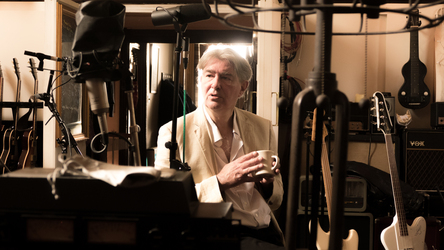
The Jazz Butcher
Press
THE JAZZ BUTCHER’S FINAL ALBUM IS ‘THE HIGHEST IN THE LAND’
- February 08, 2022
Published: Pop Matters
(Queens, NY, USA)
February 08, 2022
Credit:
;;
Source:
www.popmatters.com
Album Review: Highest in the Land
Item added: 2023-09-12
The final, sadly posthumous album from the great Pat Fish (aka the Jazz Butcher) shows the British indie-pop legend was taken much too soon.
The Highest in the Land is the Jazz Butcher‘s (aka Pat Fish, née Patrick Huntrods) first studio album since Last of the Gentleman Adventurers in 2012. Sadly, it is also his last. Fish died at home in October 2021. He was only 63, but on “Time” from the new record, he seems resigned to his fate: “My hair’s all wrong / My time ain’t long / Fishy go to Heaven, get along, get along.” In a recent series of fan Q&A videos, Fish is hardly seen without a cigarette or a pint in hand. He did it his way, playing small club shows and, later, online sessions with his friends, staying classy, with no regrets. This intimate, comfortable mood translates to The Highest in the Land. The sultry, woozy, 1920s-style shuffle of “Melanie Hargreaves’ Father’s Jaguar” sets the tone, sounding like it is wafting in from the smoky backroom of a bygone speakeasy. The appearance of longtime foil Max Eider on guitar adds to the vintage feel. Within this cozy milieu, The Highest in the Land is typically eclectic, touching on several styles that Fish is fond of—pop, rock, rockabilly, blues, and, of course, jazz. All of it is grounded in pleasingly jangly hollow body guitar. The one exception to the overall feel, and the one musical surprise, is the instrumental “Amalfi Coast May 1963”. The track sounds exactly like its title, referencing an Italian coastal village. The gently shuffling rhythm and odd time signature lead to swooning, widescreen strings, and a melody that suggests drama, but not enough to disturb the cocktail in one’s hand. It’s a retro easy-listening treat that would be equally at home on Bert Kaempfert or Saint Etienne records, one that reveals a musical sophistication that is easy to overlook given Fish’s pop smarts. By the time they reach their later careers, some artists reach the point where the music is primarily a means to experience their lyrics, wisdom, and general gravitas. Leonard Cohen, Tom Waits, and Lou Reed come to mind. Is the Butcher worthy of such company? Surely. Although he did not reach the same level of critical attention or even commercial success, Fish was as keen, witty, insightful, and, when necessary, as ruthless. The Highest in the Land provides plenty of evidence. While the album is missing the manic discontent that often made its way into earlier work, the relative restfulness of the music belies Fish’s disillusion and frustration with the current state of affairs. When writing about any Jazz Butcher release, the temptation is to list off all the great vignettes, images, and one-liners, and The Highest in the Land is no different. “Lemmy and Bowie and Prince—all gone,” Fish laments on “Running on Fumes”. The lesson? “People like us can’t have nice things.” The track is a takedown of those who instill fear and struggle for their own gain: “Is there anything as cheap as chasing profit from despair?” he asks. Though he leaves the listener to fill in the blanks, it seems he must be speaking of politicians, global elites, and, quite possibly, corporations. “Any moment now somebody’s going to say ‘Toxic’, that’s assured,” he predicts toward the end of the song. He may be older, but Fish is still pretty quick on his feet. The music, too, is jaunty skiffle, an album standout. That isn’t the only place where Fish offers some vitriol for today’s social media-obsessed, cancel-happy culture. On “Sebastian’s Medication”, he calls it “political correctness gone mad”. His assessment is astute and eloquently worded enough to preclude any suspicion he is acting the curmudgeon: “[Everybody] screaming on the laptop in the basement / Store all the hate up and wait for it to burst out / I can’t believe you’re such an architect of your own destruction.” Again, the Stonesy music follows suit with a drawn-out, multi-tempo, distorted guitar solo. It’s not quite the incendiary noise of some past Butcher tracks, but it is easily the album’s most energized moment. Those who know Fish’s music will know he was also an unrepentant romantic. Thus, The Highest in the Land features a couple of his earnestly pretty ballads in “Never Give Up” and the poignantly-titled closing track “Goodnight Sweetheart”. Even here, though, the edge remains sharp. “Never give up,” Fish declares on the former, “until you want to.” His way, indeed. Throughout, Fish’s distinctive tenor is still boyish but also wizened and strangely comforting. Though it is certainly not a major release in what amounts to an incredible, 40-year canon, The Highest in the Land takes on particular importance because of its posthumous nature, rendering its creator’s premature death even more saddening. While the Butcher may have had nothing left to prove, he certainly had much more to say. RATING 7
The Highest in the Land
It's not often that an artist gets to do a Bowie by consciously carving their personal epitaph into the grooves of their final LP. The Highest in the Land is that rarity of an album, and it could not have been made by a more brilliantly poetic and fearlessly sarcastic writer than Pat Fish, also known as The Jazz Butcher.

![[The Highest in the Land cover thumbnail]](https://v1.jazzbutcher.com/images/releases/highest_250.jpg)